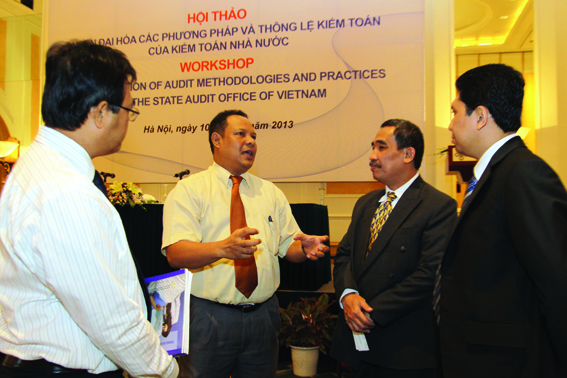The draft Enterprise Law (revised) will be submitted to the National Assembly for discussion at its upcoming session in May. Vietnam Law & Legal Forum talks with Phan Duc Hieu, head of the Central Institute for Economic Management’s Business Environment and Competitiveness Department, who is also a member of the Enterprise Law Drafting Board, about the draft law.
The draft Enterprise Law is designed to further facilitate the establishment of enterprises, ensure equal treatment between domestic and foreign investors in investment and business procedures and, at the same time, enhance the effect of state management of enterprises. How are these issues expressed in the draft?

The ultimate goal of the revised Enterprise Law is to make enterprises a cheaper, safer and more attractive tool for doing business in the eyes of investors, so as to further attract and mobilize more resources and investment capital for production and business activities. To this end, the revised law will further simplify procedures for business establishment and market entry. In light of this, several significant changes can be seen in the draft law.
First, the procedures for establishing new enterprises or acquiring shares or capital contributions in existing ones would be applied in the same way to both domestic and foreign investors.
Second, the draft law separates/distinguishes between enterprise establishment from/and business licensing for business operation in regulated sectors, abolishing the requirements on business conditions at the time of enterprise registration such as requirements on practice certificate or legal capital certification.
Third, a certificate of enterprise registration would no longer specify the names of business lines and trades, except conditional/regulated ones. All business activities that newly established enterprises will conduct would be still declared in the application for business registration, kept at National Business Registration System (NBRS) and opened for public assess. However, business activities in the application for business registration would no longer be required to code according to the national economic sector coding systems as at present. The encoding would be performed by relevant state agencies to serve their different statistical purposes. Enterprises are required to notify business registration agencies when they start a new business activity and close or suspend their business activities during operation.
Last, the draft law harmonizes enterprise registration procedures with tax, labor and social insurance ones so as to enhance coordination among related agencies and reduce paperwork and administrative costs and time for enterprises.
The draft law has a new provision that citizens may do business in all sectors and trades not banned by law, which is warmly welcomed by the business cycle. However, this may increase the burden of post-licensing inspection on state agencies. What are specific changes to be brought about by the new provision?
This new provision can be seen as a great stride in realizing the freedom of business as it will help reduce risk and cost for and increase the initiative of enterprises in conducting business activities not banned or restricted by law. However, the principle that citizens may do business in all sectors and trades not banned by law must be understood as enterprises must not conduct business lines and trades banned by law; and may engage in conditional business lines as long as they meet all the conditions set in relevant treaties and laws and must maintain these conditions throughout their operation duration. Enterprises may take the initiative in conducting business lines or trades not banned or restricted by law at the same time with notifying them to competent state agencies.
As regards state management, it must be said that the responsibility to manage and supervise enterprises does not rest on any single state authority but requires close coordination among various state agencies and is a common duty of the whole society in general and of all relevant stakeholders in particular.
In light of the Enterprise Law, the above change will not reduce the effect of state management of business activities of enterprises as the draft law is also added with provisions on new management methods.
First, the list of sectors and trades banned from business or subject to conditional business and corresponding business conditions must be publicized. Therefore, the draft law requires ministries, ministerial-level agencies and government-attached agencies to make, update and submit to the Government for promulgation lists of sectors and trades banned from business, sectors and trades subject to conditional/ regulated business and corresponding business conditions prescribed in laws, ordinances and decrees in their state management fields. This would help enterprises be aware of the conditions to be met if they want to conduct a conditional/regulated business line lawfully, while facilitating state supervision activities.
Second, enterprises may take the initiative in preparing conditions for and conducting business but have to notify business registration agencies of commencement of new business activities or close ones.
Third, the draft law enhances the coordination and sharing of information among state agencies and create favorable conditions for concerned organizations and individuals to access information about enterprises easily in order to improve the effectiveness of public supervision of enterprises’ activities. The Ministry of Planning and Investment has built a national database on enterprises (the National Business Registration System) which is basically linked with the tax sector’s databases on enterprises. In the time to come, this system will be loaded with data on violations committed by enterprises, grant or revocation of licenses and certificates, etc., so as to establish a complete database on enterprises, thus facilitating the supervision and management of enterprises throughout their operation.
The draft law introduces a new concept of social enterprise. Could you elaborate on this issue?
Like many other countries in the region and world, over the past few years, Vietnam has witnessed a quick increase in the number of enterprises operating for social objectives which are called social enterprises. Like ordinary businesses, social enterprises operate in a wide range of sectors and fields of the economy and are organized after various types of enterprise provided in the Enterprise Law such as limited liability company, joint-stock company or sole proprietorship. The differences between social and ordinary enterprises lay in their operation purposes and profit distribution.
Social enterprises operate for the purpose of addressing social or environmental issues. This mission is identified right from the establishment of enterprises and will be maintained throughout their operation, therefore, is essentially different from charity activities or social responsibilities of ordinary enterprises, which are just part of their activities.
Furthermore, social enterprises will use almost all of their profits for re-investment in the settlement of social or environmental issues as registered, instead of distributing to their members or shareholders as in the case of ordinary enterprises.
Field surveys and policy consulting workshops show that owners, managers and stakeholders of social enterprises currently operating in the country all wish for social enterprises status to be legally recognized. This would create legal grounds for adopting appropriate policies to facilitate and boost the development of social enterprises into a supplementary force besides the State, which will join the State in the settlement of the country’s social and environmental issues in conformity with the policy of building a socialist-oriented market economy.
In light of this, the draft law is added with the concept of social enterprise, legally recognizing the existence of social enterprises so as to promote their development as a new approach for settling social and environmental issues sustainably.-



